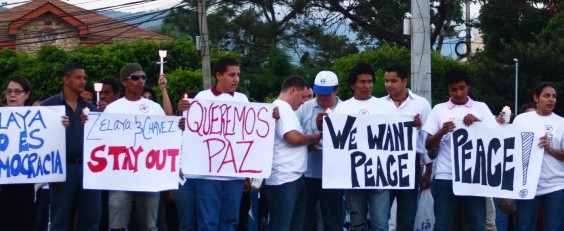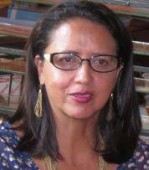Black Storm Clouds Further Threaten Freedom of Expression in Honduras
by Dina Meza translated by Katherine Wingfield-Dobbs / January 29, 2016 / No comments

Protesters during Honduras’s 2009 coup. Image via: Wikimedia Commons.
The Honduran government is considering reforms to the Penal Code which could possibly persecute dissent as an act of terrorism.
Taking advantage of the fact that reforms to the Penal Code are currently being prepared, anonymous sources report the Government of the Republic may be including articles that seriously threaten freedom of expression in Honduras. One of these includes a threat to the people’s ability to exercise social protest as a form of expression.

- Honduras has one of the world’s highest murder rates. It is also one of the most dangerous countries to practice journalism, ranking 129th out of 180 in the 2014 World Press Freedom Index. Journalists are regularly threatened, attacked, and killed for their work. The Honduran government fails to punish those who use violence against reporters, essentially granting them impunity. This space will be dedicated to examining the lack of protection for Honduran journalists exercising their profession. Topics will include the use of state-sponsored advertising as a mechanism to reward or punish publications, and censorship and self-censorship as hindrances to democratic progress.

- Born in Cofradía, Honduras, Dina Meza has been recognized by PEN International, Amnesty International, Index on Censorship and Reporters without Borders for her work as a journalist and human rights advocate. Currently, Dina is the driving force behind the creation of Honduras PEN Centre. In 2013, she wrote “Reign of Terror,” an in-depth report on threats to Honduran journalists for Index on Censorship’s magazine. In 2014, she was named one of Reporters Without Borders’ “100 Heroes and Heroines of Information.”
Discussed out of sight of the Honduran people, these reforms are intended to subdue the political dissidence of journalists, social commentators, women, human rights defenders and other social groups who oppose what they see as the dictatorship of the current ruler, Juan Orlando Hernández.
Since June 2009’s coup d’état, increasing pressure has decimated freedom of expression and information in Honduras. In response, the international community has fixed its gaze on the country, considered by Reporters without Borders to be one of the deadliest for journalists.
According to information released unofficially by an anonymous source who attended meetings where reforms to the Penal Code were discussed, in the future the government may use terrorism as an excuse to stop public protests. As a result, many, many people could be imprisoned.
In 2010, Honduras adopted the Law Against the Financing of Terrorism and indicated that those who committed acts of terrorism would be punished. The punishment would be linked to the actions for which they would be considered a terrorist. According to the anonymous source, the reform could prevent those who attended a peaceful demonstration from speaking out against the President of the Republic or condemning his abusive conduct against the people to symbolic cultural activities.
During the coup, dozens of people were accused of illegal demonstrations. The accused were the people who demonstrated against the coup and went out into the streets to protest. The police and the army carried out raids every day against people who attended peaceful demonstrations calling for a return to constitutional order.
The Public Ministry carried out the proceedings quickly. Wearing a red and black shirt with anti-coup slogans was enough evidence to condemn someone. Unlike when they dealt with agents of the State who were accused of human rights violations–the judges set them free despite the evidence of those who had been tortured–the judges were also very diligent in finding the charged protesters guilty of terrorism.
The current President of the Republic seems determined to approve laws that are detrimental to human rights. Although it is the National Congress who will decide whether to approve the reforms or not, the guidelines come from the presidential seat.
The President’s re-election aspirations make him nervous to see a citizenry who are no longer fearful and who I predict will surely take to the streets if he runs again at the end of his disastrous four year term, which ends in 2017.
Throughout Honduran history the use of the justice system, which is under the control of those in power who govern the country, is one of the tools used to contain any action that threatens the status quo.
The greatest threat is being plotted silently. It is important that the Honduran people are informed and take rapid action to neutralize the authoritarianism which hangs over the citizens.
If these reforms pass through parliament and are not met with any resolute opposition, we will have prisons full of dissidents, human rights defenders, rural people, women, indigenous people, Afro-Hondurans, and, ultimately, anyone who demonstrates verbally or as part of a peaceful demonstration.
The international community must also play its part to stop this savagery against freedom of expression, since it would wipe out all the international conventions for the protection of freedom of expression. Moreover, the funds that finance these reforms and that come from international cooperation would serve to promote authoritarianism unconditional to its respect for human rights.
Women, who realized that the reforms were decimating their hard-won rights, forced the government to include them in discussions on the reforms. Although they put a stop to some violations, but there is still much work to be done, especially in the face of overwhelming Machiavellian power does not care who it tramples because the objective is to reach the end, to arbitrariness.




